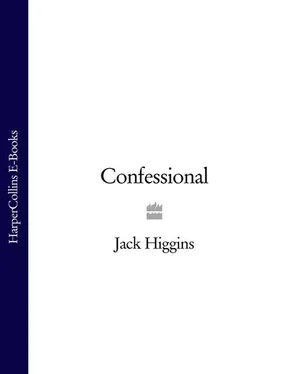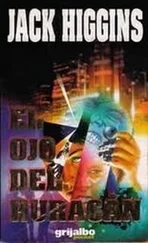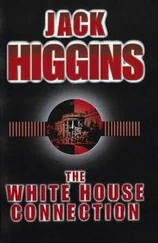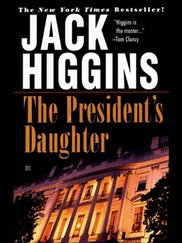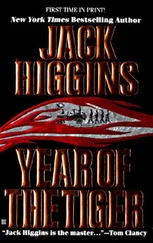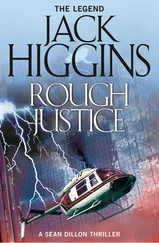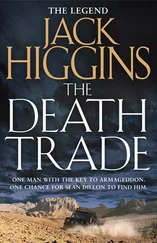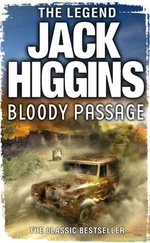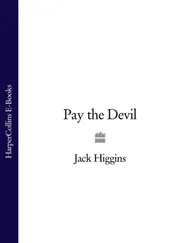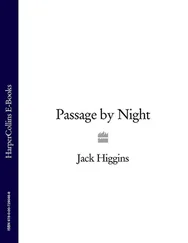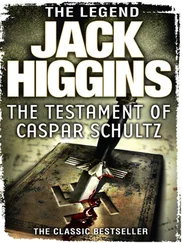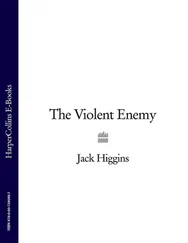His superiors had every faith in him, and had given him carte blanche to extend the system, which explained the existence of a small Ulster market town called Drumore in the depths of the Ukraine.
The room he used as an office when visiting from Moscow was conventional enough, with a desk and filing cabinets, a large map of Drumore on the wall. A log fire burned brightly on an open hearth and he stood in front of it enjoying the heat, nursing a mug of strong black coffee laced with vodka. The door opened behind him as the man in the leather coat entered and approached the fire, shivering.
‘God, but it’s cold out there.’
He helped himself to coffee and vodka from the tray on the desk and moved to the fire. Paul Cherny was thirty-four years of age, a handsome good-humoured man who already had an international reputation in the field of experimental psychology; a considerable achievement for someone born the son of a blacksmith in a village in the Ukraine. As a boy of sixteen, he had fought with a partisan group in the war. His group leader had been a lecturer in English at the University of Moscow and recognized talent when he saw it.
Cherny was enrolled at the University in 1945. He majored in psychology, then spent two years in a unit concerned with experimental psychiatry at the University of Dresden, receiving a doctorate in 1951. His interest in behaviourist psychology took him to the University of Peking to work with the famous Chinese psychologist, Pin Chow, whose speciality was the use of behaviourist techniques in the interrogation and conditioning of British and American prisoners of war in Korea.
By the time Cherny was ready to return to Moscow, his work in the conditioning of human behaviour by the use of Pavlovian techniques had brought him to the attention of the KGB and Maslovsky in particular, who had been instrumental in getting him appointed Professor of Experimental Psychology at Moscow University.
‘He’s a maverick,’ Maslovsky said. ‘Has no respect for authority. Totally fails to obey orders. He was told not to carry a gun, wasn’t he?’
‘Yes, Comrade Colonel.’
‘So, he disobeys his orders and turns a routine exercise into a bloodbath. Not that I’m worried about these damned dissidents we use here. One way of forcing them to serve their country. Who were the policemen, by the way?’
‘I’m not sure. Give me a moment.’ Cherny picked up the telephone. ‘Levin, get in here.’
‘Who’s Levin?’ Maslovsky asked.
‘He’s been here about three months. A Jewish dissident, sentenced to five years for secretly corresponding with relatives in Israel. He runs the office with extreme efficiency.’
‘What was his profession?’
‘Physicist – structural engineer. He was, I think, involved with aircraft design. I’ve every reason to believe he’s already seen the error of his ways.’
‘That’s what they all say,’ Maslovsky told him.
There was a knock on the door and the man in question entered. Viktor Levin was a small man who looked larger only because of the quilted jacket and pants he wore. He was forty-five years of age, with iron-grey hair, and his steel spectacles had been repaired with tape. He had a hunted look about him, as if he expected the KGB to kick open the door at any moment, which, in his situation, was a not unreasonable assumption.
‘Who were the three policemen?’ Cherny asked.
‘The sergeant was a man called Voronin, Comrade,’ Levin told him. ‘Formerly an actor with the Moscow Arts Theatre. He tried to defect to the West last year, after the death of his wife. Sentence – ten years.’
‘And the child?’
‘Tanya Voroninova, his daughter. I’d have to check on the other two.’
‘Never mind now. You can go.’
Levin went out and Maslovsky said, ‘Back to Kelly. I can’t get over the fact that he shot that man outside the bar. A direct defiance of my order. Mind you,’ he added grudgingly, ‘an amazing shot.’
‘Yes, he’s good.’
‘Go over his background for me again.’
Maslovsky poured more coffee and vodka and sat down by the fire and Cherny took a file from the desk and opened it. ‘Mikhail Kelly, born in a village called Ballygar in Kerry. That’s in the Irish Republic. 1938. Father, Sean Kelly, an IRA activist in the Spanish Civil War where he met the boy’s mother in Madrid. Martha Vronsky, Soviet citizen.’
‘And as I recall, the father was hanged by the British?’
‘That’s right. He took part in an IRA bombing campaign in the London area during the early months of the Second World War. Was caught, tried and executed.’
‘Another Irish martyr. They seem to thrive on them, those people.’
‘Martha Vronsky was entitled to Irish citizenship and continued to live in Dublin, supporting herself as a journalist. The boy went to a Jesuit school there.’
‘Raised as a Catholic?’
‘Of course. Those rather peculiar circumstances came to the attention of our man in Dublin who reported to Moscow. The boy’s potential was obvious and the mother was persuaded to return with him to Russia in 1953. She died two years later. Stomach cancer.’
‘So, he’s now twenty and intelligent, I understand?’
‘Very much so. Has a flair for languages. Simply soaks them up.’ Cherny glanced at the file again. ‘But his special talent is for acting. I’d go so far as to say he has a genius for it.’
‘Highly appropriate in the circumstances.’
‘If things had been different he might well have achieved greatness in that field.’
‘Yes, well he can forget about that,’ Maslovsky commented sourly. ‘His killing instincts seem well developed.’
‘Thuggery is no problem in this sort of affair,’ Cherny told him. ‘As the Comrade Colonel well knows, anyone can be trained to kill, which is why we place the emphasis on brains when recruiting. Kelly does have a very rare aptitude when using a handgun, however. Quite unique.’
‘So I observed,’ Maslovsky said. ‘To kill like that, so ruthlessly. He must have a strong strain of the psychopath in him.’
‘Not in his case, Comrade Colonel. It’s perhaps a little difficult to understand, but as I told you, Kelly is a brilliant actor. Today, he played the role of IRA gunman and he carried it through, just as if he had been playing the part in a film.’
‘Except that there was no director to call cut ,’ Maslovsky observed, ‘and the dead man didn’t get up and walk away when the camera stopped rolling.’
‘I know,’ Cherny said. ‘But it explains psychologically why he had to shoot three men and why he fired at Murphy in spite of orders. Murphy was an informer. He had to be seen to be punished. In the role he was playing, it was impossible for Kelly to act in any other way. That is the purpose of the training.’
‘All right, I take the point. And you think he’s ready to go out into the cold now?’
‘I believe so, Comrade Colonel.’
‘All right, let’s have him in.’
Without the hat and the raincoat Mikhail Kelly seemed younger than ever. He wore a dark polo-neck sweater, a jacket of Donegal tweed and corduroy slacks. He seemed totally composed, almost withdrawn, and Maslovsky was conscious of that vague feeling of irritation again.
‘You’re pleased with yourself, I suppose, with what happened out there? I told you not to shoot the man Murphy. Why did you disobey my orders?’
‘He was an informer, Comrade Colonel. Such people need to be taught a lesson if men like me are to survive.’ He shrugged. ‘The purpose of terrorism is to terrorize. Lenin said that. In the days of the Irish revolution, it was Michael Collins’s favourite quotation.’
‘It was a game, damn you!’ Maslovsky exploded. ‘Not the real thing.’
Читать дальше
